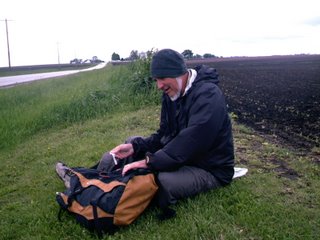
Day 10 LaGrange IN --108 Miles
Sept 13, 1838; May 8, 2006
Dressed in their new shirts and leggings made from the calico cloth distributed at Battle Ground, the Potawatomie party now passed beside Lafayette skirting the north then west side of the town to return back to the shores of the Wabash river to Lafayette’s rival port town, LaGrange. Here from this bustling town they invited a father-son team of physicians, the Ritchies to examine the Indians. The doctors reported 106 cases of sickness among the 900 Indians. The records of the party shows no record of any payment to the Ritchies so I presume they did this work gratis. There was an official physician of the party, but he had yet to show up (though he was getting paid).
In 1838 LaGrange on the Wabash competed successfully with Lafayette. But, alas, having a good port on the Wabash River would not be enough in the future. When the mighty railroad came through later it bypassed LaGrange and went through Lafayette. Today, Lafayette has both the railroad and Purdue University; LaGrange has a sign telling how it went out of existence.
There is one written record of seeing these Indians. One citizen from Lafayette went out to LaGrange to see the Indian removal, Sanford Cox. His mournful description was published in his 1860 book which has been recently been reprinted under a new title Old Settlers.” He and a few others rode horses out the 8-9 miles West of Lafayette to see the band and he wrote the following: “It was a sad and mournful spectacle to witness these children of the forest slowly retiring form the home of their childhood… All these [lands, trees] they were leaving behind them to be desecrated by the plowshares of the white man. As they cast mournful glances back toward these loved scenes, that were rapidly fading in the distance, tears fell from the cheek of the downs cast warrior, old men trembled, matrons wept, the swarthy maiden’s cheek turned pale, and sighs and half-suppressed sobs escaped from the motley groups as they passed along, some on foot, some on horseback, and others in wagons—sad as a funeral procession.”
It is not clear if this description was written at the time, or as Sanford Cox remembered it 20 years later, but forgiving the sophomoric attempt at poetry, if he did not describe the Indians wholly accurately what he said was nevertheless true—for this was certainly the spirit of the forced removal of these Indians. They were a broken people. A remnant. They had taken on the US Empire and lost. Now they depended on the white man for their calico and blankets. Once proud and ferocious warriors now begged to be allowed to go hunting for a bit of game—and were told no by their white guards. So they marched west to Kansas where they were told they would have houses to live in and a full years welfare payments from the government to help them get established across the Mississippi where there were no “states” and into land now called “Indiana Territory.” If they only had known that even these Indian territories would one day all be states too they might have been less submissive. But as good Catholics they submitted and tried to show their Christian character to be a witness to their guards.
AS FOR ME I returned to this trail after a day off with my wife and began walking through Lafayette Sunday evening when behind me I heard, “Dr. Drury, is that you?” It was Micah, a grad student at Purdue in history who had heard about my walk from Brooks Sayer in Logansport. Micah was on his way to see his girlfriend when he spied me on the road in front of her house. I spent the night on Micah’s couch and left long before he took his first morning rollover I suspect.
For my breakfast I had a hot dog at the Ravines golf course where I also took a census of who plays golf Monday mornings. I counted 37 golfers in all (34 white males, one afro-American and one woman.)
Like the Indians, I too returned to the Wabash and found the site of LaGrange moving right past it since I’d heard from Shirley Willard that Linda Klinger had a great restaurant in Independence. I mentally ordered several suppers before finding the restaurant burned completely to the ground. I ate supper at the only other business in Independence Indiana—the Coke machine where I deposited 50 cents and pressed Root Beer and got a Mountain Dew. I put in another two sets of quarters and this time I pressed a seven up and got—another Mountain Dew. Shrugging I chugged them both down and walked on with enough caffeine in me to get to the next state before dark. In an hour I found a shady spot near a creek and I camped for the night—and was asleep by seven o’clock, long before dark. Despite the 24 oz. of Mountain dew.

0 Comments:
Post a Comment
<< Home